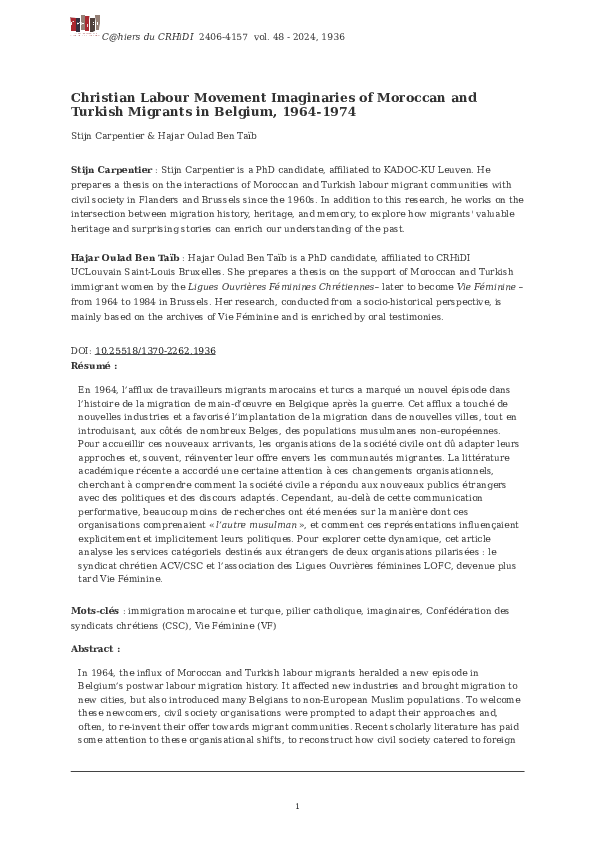Christian Labour Movement imaginaries of Moroccan and Turkish migrants in Belgium, 1964-1974

Carpentier, Stijn ; Oulad Ben Taïb, Hajar
C@hiers du CRHiDI. Histoire, droit, institutions, société
2024
48
25 p.
trade union ; labour movement ; migrant worker
Trade unionism
https://doi.org/10.25518/1370-2262.1936
English
"En 1964, l'afflux de travailleurs migrants marocains et turcs a marqué un nouvel épisode dans l'histoire de la migration de main-d'œuvre en Belgique après la guerre. Cet afflux a touché de nouvelles industries et a favorisé l'implantation de la migration dans de nouvelles villes, tout en introduisant, aux côtés de nombreux Belges, des populations musulmanes non-européennes. Pour accueillir ces nouveaux arrivants, les organisations de la société civile ont dû adapter leurs approches et, souvent, réinventer leur offre envers les communautés migrantes. La littérature académique récente a accordé une certaine attention à ces changements organisationnels, cherchant à comprendre comment la société civile a répondu aux nouveaux publics étrangers avec des politiques et des discours adaptés. Cependant, au-delà de cette communication performative, beaucoup moins de recherches ont été menées sur la manière dont ces organisations comprenaient « l'autre musulman », et comment ces représentations influençaient explicitement et implicitement leurs politiques. Pour explorer cette dynamique, cet article analyse les services catégoriels destinés aux étrangers de deux organisations pilarisées : le syndicat chrétien ACV/CSC et l'association des Ligues Ouvrières féminines LOFC, devenue plus tard Vie Féminine."
"In 1964, the influx of Moroccan and Turkish labour migrants heralded a new episode in Belgium's postwar labour migration history. It affected new industries and brought migration to new cities, but also introduced many Belgians to non-European Muslim populations. To welcome these newcomers, civil society organisations were prompted to adapt their approaches and, often, to re-invent their offer towards migrant communities. Recent scholarly literature has paid some attention to these organisational shifts, to reconstruct how civil society catered to foreign audiences with adapted policies and discourses. Beyond this performative communication, however, much less research has been done on how these organisations understood ‘the Muslim other', and how such imaginaries explicitly and implicitly shaped their policies. To explore this dynamic, this article analyses the categorical foreigner services of two pillarized bodies, namely the Christian trade union ACV/CSC and the Ligues Ouvrières Féminines Chrétiennes LOFC, the later Vie Féminine."
This work is licensed under the terms of the Creative Commons Attribution 4.0 International License (http://creativecommons.org/licenses/by/4.0/).
Digital
Table of content:
Introduction
The Christian labour organisations and Migration
A Gendered Imaginary of Migrant Families
Strategies for Migrant Emancipation
Limits of the categorical approach
Migrant Counter Voices
Conclusion
The ETUI is co-funded by the European Union. Views and opinions expressed are however those of the author(s) only and do not necessarily reflect those of the European Union or the ETUI.